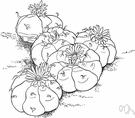peyote
(redirected from peyotl)Also found in: Thesaurus, Medical.
pe·yo·te
(pā-ō′tē) also pe·yo·tl (-ōt′l)n.
1. A spineless, dome-shaped cactus (Lophophora williamsii) native to Mexico and the southwest United States, having buttonlike tubercles that contain the hallucinogen mescaline and are traditionally used in rituals by certain Native American peoples. Also called mescal.
2. Peyote buttons.
[American Spanish, from Nahuatl peyotl, caterpillar cocoon, peyote (because the tufts of woolly hair in the center of its tubercles resemble caterpillar cocoons).]
American Heritage® Dictionary of the English Language, Fifth Edition. Copyright © 2016 by Houghton Mifflin Harcourt Publishing Company. Published by Houghton Mifflin Harcourt Publishing Company. All rights reserved.
peyote
(peɪˈəʊtɪ; pɪ-)n
(Plants) another name for mescal1
[Mexican Spanish, from Nahuatl peyotl]
Collins English Dictionary – Complete and Unabridged, 12th Edition 2014 © HarperCollins Publishers 1991, 1994, 1998, 2000, 2003, 2006, 2007, 2009, 2011, 2014
pe•yo•te
(peɪˈoʊ ti)n., pl. -tes.
3. mescaline.
4. (in Mexico) any of several cacti related to or resembling mescal.
[1840–50, Amer.; < Mexican Spanish < Nahuatl peyotl]
Random House Kernerman Webster's College Dictionary, © 2010 K Dictionaries Ltd. Copyright 2005, 1997, 1991 by Random House, Inc. All rights reserved.
ThesaurusAntonymsRelated WordsSynonymsLegend:
Switch to new thesaurus
| Noun | 1. |  peyote - a small spineless globe-shaped cactus; source of mescal buttons peyote - a small spineless globe-shaped cactus; source of mescal buttonscactus - any succulent plant of the family Cactaceae native chiefly to arid regions of the New World and usually having spines genus Lophophora, Lophophora - two species of small cacti of northeastern Mexico and southwestern United States having rounded stems covered with jointed tubercles: mescal magic mushroom, mescal button, sacred mushroom - the button-shaped top of the mescal cactus; a source of psilocybin |
| 2. |  peyote - the hallucinatory alkaloid that is the active agent in mescal buttons peyote - the hallucinatory alkaloid that is the active agent in mescal buttonshallucinogen, hallucinogenic drug, psychedelic drug, psychodelic drug - a psychoactive drug that induces hallucinations or altered sensory experiences magic mushroom, mescal button, sacred mushroom - the button-shaped top of the mescal cactus; a source of psilocybin |
Based on WordNet 3.0, Farlex clipart collection. © 2003-2012 Princeton University, Farlex Inc.
TranslationsSelect a language:
Spanish / Español
Collins Spanish Dictionary - Complete and Unabridged 8th Edition 2005 © William Collins Sons & Co. Ltd. 1971, 1988 © HarperCollins Publishers 1992, 1993, 1996, 1997, 2000, 2003, 2005
pe·yo·te
, peyotln. peyote, planta de la que se extrae la mescalina, droga alucinatoria.
English-Spanish Medical Dictionary © Farlex 2012
peyote
n peyote mEnglish-Spanish/Spanish-English Medical Dictionary Copyright © 2006 by The McGraw-Hill Companies, Inc. All rights reserved.